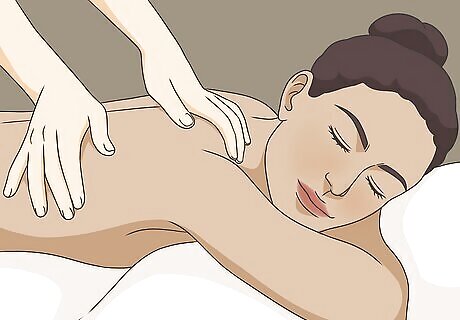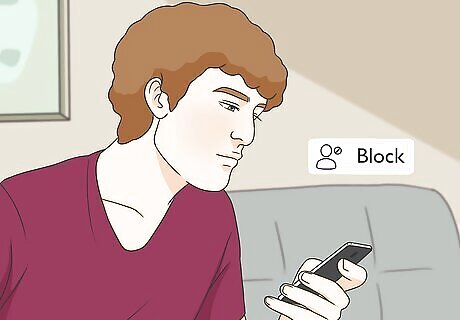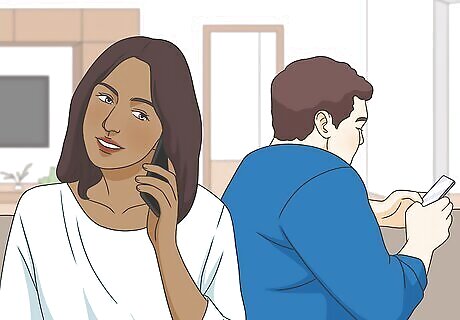
views
Moving On From a Situationship

Allow yourself to grieve. Whatever emotions you’re feeling at the end of your situationship, let them out. Avoid giving yourself any fake consolations like It wasn’t real anyways or I saw it coming. The loss of a situationship is “a loss just like all losses, just like when you lose a committed relationship,” counsels dating coach John Keegan. “You could say, ‘Oh, it wasn’t my boyfriend’ or ‘It wasn’t my girlfriend,’” continues Keegan. “But it was something that you had…so it’s just about honoring that [and saying], ‘Hey, this is a loss and it was something to me.” To help yourself grieve the end of a situationship, feel free to ugly cry! Get all the tears and emotions out in any way that you can. Keep a journal or talk to a therapist to help you process and work through your feelings.

Acknowledge the relationship for what it was. A situationship isn’t viewed as a “real” relationship, so you may think that it should be easy to move on. After all, if you never used the terms “boyfriend,” “girlfriend,” or “partner,” did the relationship even happen? In a word, yes. More often than not, you spend part of your situationship fantasizing about being in a committed relationship with this person. Even if you never made it to that committed relationship, you invested your time, energy, and feelings into that hope for the future. “The reason you can’t get over [the situationship],” says dating expert John Keegan, “is because you kind of hoped it would turn into something more, or at least something ongoing. And now that hope is over.” But now that that hope is over, you can heal and move on. Acknowledge that your feelings were real, and the label on your relationship has nothing to do with how deeply you felt.

Be kind to yourself. It’s so easy to beat yourself up after a situationship ends—we’ve all been there. After all, what’s so wrong with you that someone can’t commit to you for more than a few months? Give yourself some grace, and try to remember that the end of a situationship doesn’t reflect badly on you (and you deserve better). When a person ghosts you or suddenly cuts ties (which is often how situationships end), it’s usually because of their own attachment style or insecurities. They may lack the maturity to be in a committed relationship, or if they’re truly not in a place for anything serious, they should have let you know that and maturely ended things. Do not ever convince yourself that a situationship ended because you are not enough—you’ll be the perfect amount for the right person, and now you have a chance to find them. During your healing process, don’t put a timeline on your healing process or compare yourself to others (especially people who are going through a “real” relationship breakup). On your hardest days, take care of yourself by doing things that bring you joy, like going for a walk, making plans with a friend, or treating yourself to your favorite Doordash order.

Practice self-care. Self-care is more than just putting on a face mask and sitting down with a pint of ice cream (although we’re game for that too). Invest in whatever form of self-care helps you feel better: being active, spending time outside, booking a massage, going out to dinner with your friends, volunteering on the weekends, or practicing a random act of kindness every day.

Lean on your support systems. Reach out to close friends and family members who will happily give you a shoulder to cry on. Vent to them and let out all the feelings you’re feeling. Try to let go of any embarrassment you have around being in a situationship or feeling so strongly about this person that you never actually dated. Your sadness is valid, and your friends are there to help you ease the pain. Talking to a more objective party can also help you get a new perspective on your situationship. Once you’re past the first few emotional waves, listen to their insights into the relationship. More often than not, your trusted friends will gently help you realize that this person wasn’t all you built them up to be in your head.

Limit contact with your situationship. After the situationship ends, avoid reaching out to the other person. Relapsing into a situationship will make it much harder for you to heal and move on (plus, you don’t want to give them the satisfaction of knowing you’re still hung up on them). Block their number, unfollow them on social media, and delete your texts from your phone. If you can’t completely cut ties for whatever reason—maybe you work together or are part of the same friend group—try setting boundaries with your ex-situationship instead. Reduce the frequency of your interactions with this person. If you have mutual friends, for example, agree to only be at the same hangouts if they are important events like a birthday party or wedding. When you do have to see them, reduce the level of vulnerability or emotional support you give to each other. Keep your conversations to surface-level, day-to-day small talk, and avoid any emotional situations or topics.

Stay busy. Once you’ve taken the appropriate amount of time to grieve and wallow (just a little bit), take all that energy you were using up on your situationship and invest it in yourself! Take yourself on solo movie or dinner dates. Explore a new neighborhood in your city or take a day trip to a nearby nature hike. Cook a cool new recipe that you’ve always been wanting to try. Create a vision board outlining your short-term and long-term goals, and get excited about moving toward them! If you have the budget and free time, enroll in a dance or cooking class, learn a new language, or join a book club. This part of your healing journey is all about learning to love yourself again and enjoying all the time you now get to spend in your own company.

Avoid jumping back into dating. While a rebound can be tempting, you may just find yourself starting from scratch with a new situationship. Instead, take the time you need to heal and reflect on what you’ve been through. When you’re ready to start dating again, you’ll be doing so because you want a loving and supportive romantic partner—not because you’re trying to escape the pain you’re feeling now. If you’re really feeling the urge to jump into a fling, focus that energy on friendships instead. Let your close friends know how you’re feeling, and they’re sure to find time to spend with you so you get those social connections that you’re craving. You can also use a dating app (risky, we know) that has a friend-finding service like for Friends.

Reflect on what you learned from your situationship. After you’ve gotten past the major emotional hump of your situationship break up, “evaluate what your values are now after having had that experience,” advises dating expert John Keegan. Ask yourself questions like “What do I value now?” continues Keegan. “What do I want now? Maybe it’s different from what I wanted before I had that experience.” What role did the situationship fulfill for you? What perceived “hole” in your life was it filling? What do you want in your next relationship? What sort of boundaries do you want you and your partner to have? What are your priorities in a relationship? Emotional connection? Sexual attraction? Commitment? Are you looking for a long-term relationship? Or are you okay with dating casually and seeing where things go?

Focus on new opportunities and experiences. You can consider this phase of getting over a situationship as fully moving on—although it may not feel like it yet. This step is where you get to reframe your whole perspective. You’ve reflected on your situationship, you’ve taken the time to heal, and it’s time for you to look forward. Protect your peace: Engage in mindfulness exercises like meditation, set boundaries with negative people, and reduce your time spent scrolling social media. Learn to enjoy your own company: Allow yourself to be present when you’re alone (put down the phone), practice gratitude, set intentional times to go on solo dates. Discover new interests: Sign up for a local club or sports team, take a free class at the community college, set a reading goal for the next month, join a volunteer organization. Foster and build connections: Spend more time with your friends and family, make new friends through local mixers or community events, date people who really make you feel good about yourself. Focus on personal growth: Define your core values, set goals for yourself, use positive affirmations daily.
What is a situationship?

A situationship is a romantic relationship with no labels or obligations. Often, these situationships have all the signs and benefits of a traditional relationship—but without any commitment. As John Keegan, dating coach and founder of The Awakened Lifestyle defines it, situations mean that “you got together in some way…sometimes just sexual [or] hanging out….but you had some intimacy with that person or felt a deep connection in some way.” These ambiguous relationships aren’t inherently bad. Still, they can lead to a lot of anxiety, fear of communication, and one person getting hurt if they develop stronger feelings. Situationships are different from “friends with benefits” because the latter suggests that the pair really are just friends who are intimate with each other, without any deeper emotional connection or potential to fall in love.

Situationships aren't exclusive. You’ve never talked about defining the relationship or making it a rule not to see other people. Another sign of a situationship is a lack of clear boundaries about things like spending the night at each other’s homes, splitting the bill at a fancy dinner, or meeting each other’s families. Other signs that you may be in a situationship include: Inconsistent communication—you may talk several times one week and then not at all the next. Separate lives—you’ve never met each other’s parents or friends, and you aren’t integrated into each other’s lives. There’s no discussed future—you don’t talk about what either of you wants long-term; you’re just focused on what’s working right now. Most of the time, situationships happen accidentally. You may be dating someone and seeing where things go without defining the relationship and, all of a sudden, you find yourself in a situation.

Situationships can hurt worse than a committed relationship breakup. Lots of people feel confused as to why the end of their six-week situationship is harder to get over than their six-year relationship. Often, this is because the lack of clear commitment in situationships can dredge up a lot of anxiety and fear around rejection and embarrassment. Plus, situationships hold a lot of unrealized potential. Maybe you imagined a future with this person, and you never even got to answer the what ifs of if you would’ve lived happily ever after together. Finally, situationships feel so bad because you rarely get any resolution with this person. They don’t “owe” you a conversation, because you were never together! This can make getting over a situationship especially hard because you don’t get the same emotional and societal validation that people do when they end a committed relationship. All this to say, it’s normal to feel really hurt after a situationship ends. Clearly, other people have been through it before and gotten through it. You will too.




















Comments
0 comment